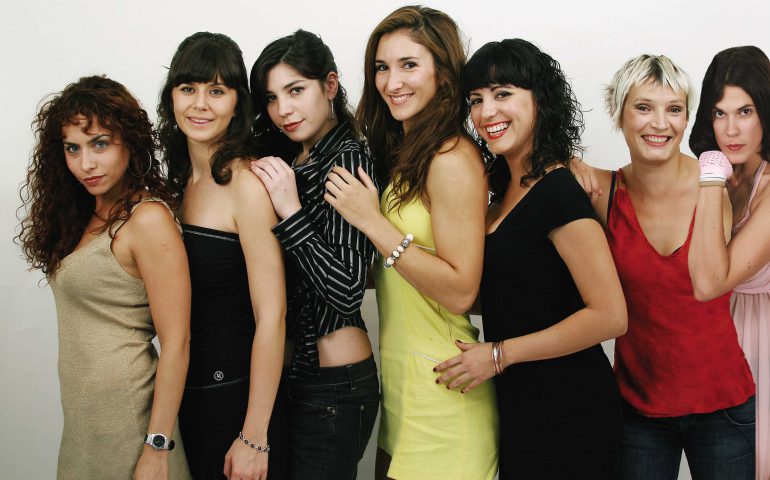Apples
Created and Written by Olga Martí and Verónica Segoviano
Directed by Alfonso Diaz
Imagine The L Word as a campy, low-budget online series in Spanish (with English subtitles), and you’ve got Apples, a lighthearted romp through the lives of seven lesbian 20-somethings who share two flats in the same apartment building in Spain. Co-creators Olga Martí and Verónica Segoviano have taken a DIY-approach to writing and producing the series, which they feel “aims at disclosing the lesbian reality, largely neglected in the Spanish entertainment products.”
As in The L Word, all the women are slender and attractive (that’s showbiz, baby), but they’re far less privileged, and their bodies are somewhat more relatable than the LA-lean bodies and six-pack abs we’re used to seeing on the screen. The lineup of characters includes Sam (Marta Villar), the marketing student; Barbi (Teresa Hernando), the tourism student; Doc (Saskia Guanche), the medical student; Ade (Gloria March), the business student; Nanai (Karen Owens), the philosophy student/nudist; Pixel (Patricia Arizmendi), the IT student/hacker; and Manitas (Alicia Lobo), the go-go dancer/newspaper distributer/handywoman around the house. Several of the women have been disowned by their parents because of their sexuality, and thus they turn to one another for mutual support and understanding while they earn their degrees and try to build their lives on their own terms.
Nearly all of them keep one or more part-time jobs in order to support their education. In their free time, they rehearse their “Macho Man” drag routine and throw parties for CLIT (Colectivo de Lesbians Independientes y Tolerantes).
Each two-part webisode is about 12 minutes long, and plot lines are continuous from week to week. Ongoing themes include Ade’s journey from straight to bi-curious to bisexual and so on, Nanai’s relentless pursuit of Sam, Sam’s affair with Doc, and Doc’s unresolved romantic ties to Manitas, the baby-dyke of the group, who fled her parents’ provincial, country home in order to come out.
The John Waters-esque camp element gives rise to a bit of mystery; several questions linger in the first season’s wake. For example, why is the show called Apples? Why do the women keep a cross-dressing mannequin called “Cari” in the flat, and talk to it as though it were alive? Why does Ade carry a stuffed cat called “Chichi” (read: “pussy”) nearly everywhere she goes, and why does Pixel pretend to be allergic to it? Why is the façade of their apartment building painted over with a curious encryption of zeros and ones? Why, in one memorable scene, do all the women wear kelly-green shirts? I’m damned if I know, but in any case, Apples is a charmingly interesting reminder that shows can be produced and published independently of big-wig network sponsorship. The show’s DIY-strategy might just inspire you to grab a video camera and start your own online series. Bonus: those who speak the language can ignore the subtitles, while the rest of us bone up on our colloquial Spanish. Check it out at appleslaserie.com.


What Do You Think?